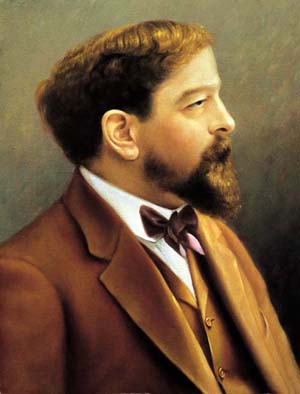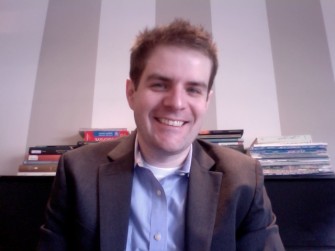
Claude Debussy
In the process of attaining such originality, Debussy tapped a spectrum of inspirational sources. Perhaps the greatest musical influence on his development was Wagner, whose emotionally charged operas enthralled Debussy during his formative years. But as the French composer matured, he grew disillusioned with his idol on account of Wagner’s mushrooming dominance over French culture during the final decades of the nineteenth century. In Debussy’s view, “Wagnermania” had the harmful effect of suppressing individual creativity in favor of aesthetic conformism, so the French composer determined to write music that pushed beyond the accomplishments of Wagner. To be sure, Debussy maintained a healthy respect for Wagner’s harmonic sorcery and luminous orchestration, and he frequently incorporated these features into his own works, but going forward the French composer focused his attention on more exotic sources of musical vitality.
As fate would have it, Debussy came into contact with one of these exotic alternatives just as his love for Wagner’s music was diminishing. Over the course of the 1889 Paris World’s Fair, which gave rise to the famed Eiffel Tower, Debussy avidly attended performances of Javanese gamelan music, an experience that opened the French composer’s ears to a world of ringing metallophones free of Wagnerian gestures.
Debussy’s fascination with the gamelan informed two of his most novel pieces, both of which will receive performances during The Prismatic Debussy festival: “Nuages,” the first movement of his orchestral Nocturnes, and “Pagodes,” which opens his piano triptych Estampes.
In addition to initiating Debussy into the musical traditions of Java, the 1889 World’s Fair kindled the composer’s passion for Russian music, thanks to two symphonic concerts that were given under the direction of Rimsky-Korsakov. The second of these concerts featured music by Musorgsky, and over the next few years Debussy became a great admirer of the Russian composer’s output, which differs markedly from Wagner’s on account of its highly unorthodox character. As it happened, Debussy was engrossed with Musorgsky’s Boris Godunov when he began the composition of his own operatic masterwork, Pelléas et Mélisande. Affinities between the two works abound, particularly with respect to prosody as both Boris and Pelléas teem with vocal parts that mirror the inflections of ordinary speech. A highlight of the festival will be the re-imagining of Debussy’s opera by Eastman musicians in collaboration with comic-book creator P. Craig Russell.
Speaking of comic books, visual art influenced Debussy just as much as exotic musics, from the woodblock prints of such Japanese masters as Hiroshige and Hokusai to the Impressionist paintings of Monet and Degas. The composer’s interest in the visual arts, and for that matter other mediums of expression like poetry, drama and film, reflects his commitment to the Symbolist ideal of cross-pollination between the arts. The Prélude à l’après-midi d’un faune and L’Isle joyeuse, both of which are featured in new arrangements during the festival, exemplify Debussy’s proclivity for finding inspiration outside of the realm of music: the former pays homage to verses by the Symbolist poet Mallarmé, whereas the latter alludes to a canvas by Watteau, an exponent of the Rococo style. Reveling in pastoral imagery, these two compositions also highlight Debussy’s veneration for the natural world, which he regarded as the supreme source of beauty and innovation in the universe. Indeed, nature may be viewed as Debussy’s primary muse, as evidenced by the numerous evocations of natural phenomena that appear throughout his œuvre.

Matthew Morrow
Matthew Morrow, Ph.D.
Instructor of Musicology
Eastman School of Music